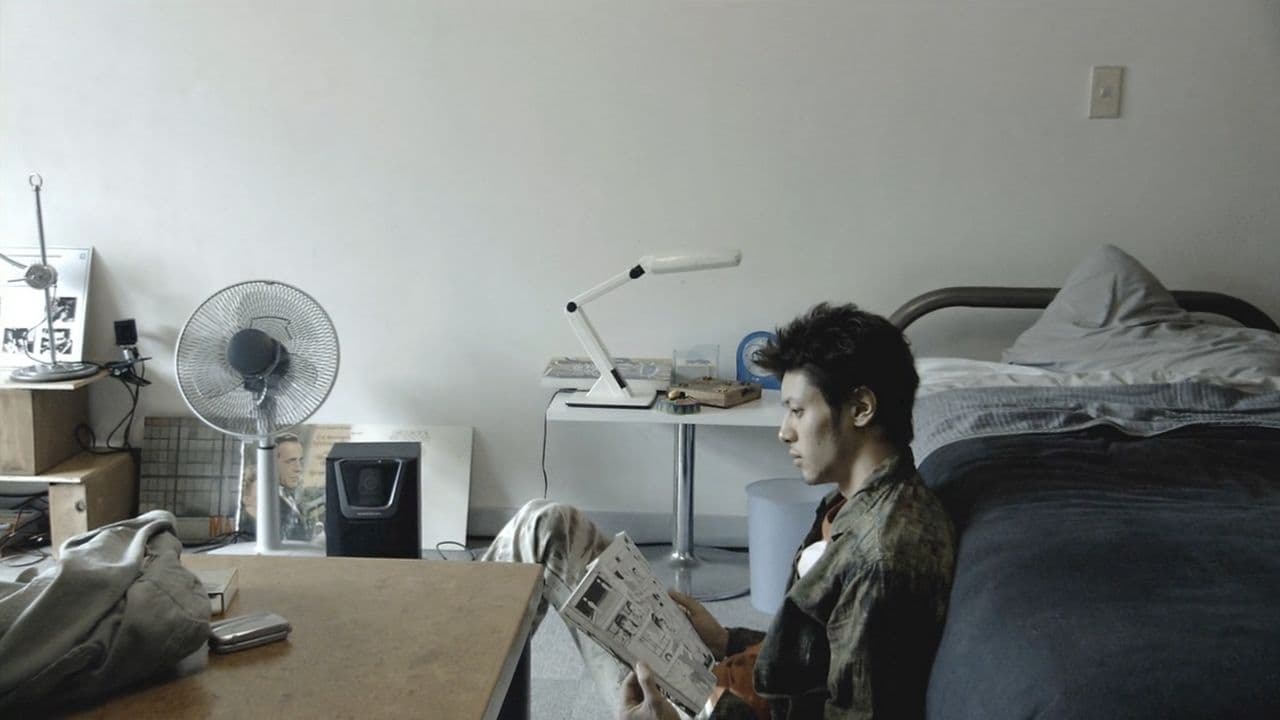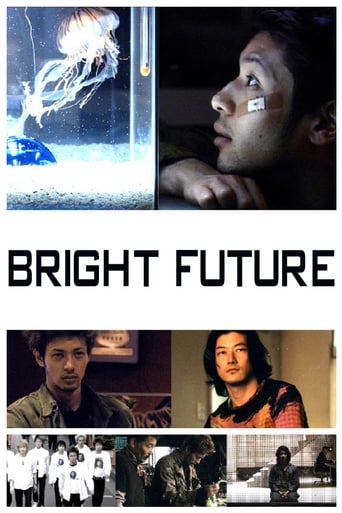

Absolutely amazing
... View MoreThe movie runs out of plot and jokes well before the end of a two-hour running time, long for a light comedy.
... View MoreVery good movie overall, highly recommended. Most of the negative reviews don't have any merit and are all pollitically based. Give this movie a chance at least, and it might give you a different perspective.
... View MoreThis is ultimately a movie about the very bad things that can happen when we don't address our unease, when we just try to brush it off, whether that's to fit in or to preserve our self-image.
... View Moreif your an American over 30 you won't get this unless you know about young Japanese culture. Likewise, if you are intelligent, and under this "age limit" you will get this movie. Its a real interesting expose about the aimlessness youth society has taken, I found the Jellyfish metaphor intriguing. The soft spoken characters urge you to want to know more about them, yet, at the same time, you begin to think you understand them. I have really become a fan of the more "intelligent" movies that japan has to offer as of lately (as opposed to the slasher and samurai movies), and they do not disappoint. If you enjoyed Kikujiro, you will like this movie, likewise if you enjoyed this movie, be sure to check out Kikujiro. While Akarui mirai is not the best film I have ever seen, it is defiantly something i would recommend.
... View MoreI can see the maddeningly inscrutable "Bright Future" serving as the subject for some poor film school student's dissertation in a course entitled "The Use of Enigma and Symbolism in Post-Modernist Cinema" or (if you prefer the vernacular) "What the Heck Was That Film All About Anyway?" For I am absolutely convinced that one could spend a full semester - at the very least - trying to fathom the various levels of meaning in this film and never come up with a thoroughly satisfactory answer at the end of that search. And here I've always thought Ingmar Bergman movies were a challenge! Shot through with heavy doses of allegory and Magic Realism, "Bright Future" tells the story of a sullen, moody young man named Yuji, who works at a dull factory job with his close buddy, Mamoru. The latter owns a deadly Red Jellyfish that he keeps in a little tank at home. One day, he gives the jellyfish as a present to Yuji, telling him that he has decided to quit the job and move on to bigger and better things. But instead of doing that, Mamoru murders the boss and the boss' wife, with little or no explanation given as to motive. Mamoru is immediately arrested and charged with first degree murder. Meanwhile, in a fit of despair, Yuji turns over the tank, only to have the jellyfish slide through the cracks of the floor and somehow land in the Tokyo water system, where it miraculously proliferates to the point where the area is literally inundated with freshwater killer jellyfish. While all this is going on, Yuji begins to develop a close but tentative bond with Mamoru's father, who was pretty much estranged from his son before the murder. As Yuji gets more and more obsessed with finding the elusive jellyfish, he seems, paradoxically, to be coming to a greater sense of reality. Well, there's the "plot" in a nutshell; now it's your turn to try to figure it all out.If none of this makes any sense to you, don't feel bad because it doesn't make any sense to me either. The best I can make of it is that Yuji is intended to represent the younger generation in modern day Japan - disconnected, rudderless, utterly lacking in motivation, purpose and goals, and prone to act out of ill-defined impulse rather than rationality and logic. And somehow, by committing the murder that Yuji is actually intending to do (though here again, we are given no preparation or motive to explain WHY he would do so), Mamoru sacrifices himself so that Yuji can be saved from his own spiritual ennui and set on the path towards a meaningful life, primarily by caring for this jellyfish, which is itself a symbol of tenacity and beauty.Or perhaps not .Despite the fact that the film will probably have you pulling your hair out in bewilderment and frustration, "Bright Future," for all its self-conscious pretentiousness, is actually a fairly intriguing film just on the level of its visuals and the relationships it develops among the various characters. It's very well directed and very well acted, and if you can get beyond the symbol-gazing, you may actually find yourself mesmerized by the experience.And I will be expecting those dissertations on my desk bright and early tomorrow morning.
... View MoreNomura practically does not speak, in fact he could be an idiot. Mamoru seems to live in a constant and intense reflection. They both work in a oushibori factory, where the warm and humid towels given to clients at sushi restaurants are made. When not at work, they spend time playing video games or at the bowling room. Nomura admires the jellyfish that floats in Mamoru's fish tank; in his head, Mamoru can't stop thinking about his plan. They live in Tokyo, from which the spectator only sees trash, recycling material and ageless objects. Once, their boss is interested for both friends; he visits them, speaks with them about their youth. Some time after, Mamoru kills him with the rest of his family. In prison, facing death penalty, he receives the visit from his father, who he hasn't seen in years. The old man repairs old televisions and radios that finds in garbage deposits. It's been a long time since the father gave up to any contact with the world and its social ambitions. This is when Mamoru, quiet and manipulator, sets up the last part of his plan. Kiyoshi Kurosawa, the director of Bright Future,is one of Japan's most ambitious contemporary filmmakers, his work seeks to change the classic forms of cinematography to evoke a state of social reality. Born in postwar Kobe in 1955; he is the author of 17 films and three films for TV. His filmography is full of lonely characters and horror. Bright Future manifests a violent vision of the Japanese youth. Young people with no ambitions nor aspirations of any kind,sicken young people that do not fit in today's society. Violence in its most passive way. Kurosawa uses long and quiet shots, that strike upon the spectator's patience. The father's figure and his technological anachronism serve as a reference to the past, and to contrast the idea that technology drowns the modern Japanese; marginating youth to loneliness, turning them into a disperse society. The film can be interpreted as a ghost story. The ghosts of ideals an hope of social change. Ghosts of memories and ordinary practices, that in Kurosawa's work turn violent, they transform to dead ends. The mise-en-scene is magic, a dream like aesthetic that includes the invasion of Tokyo by an army of poisonous jellyfish. A plastic beauty that accompanies all the questioning and illustrates the consequences of a terrorist act. Bright Future is a philosophical exposition about the individual in society, as brilliant and at the same time as dark, that succeeds to move and interest.
... View MoreAkarui Mirai has a lot going for it. Somewhere in the mess of metaphor and "art for art's sake" is a good story with a strong message and good images. Unfortunately things get typically nonsensical with the lesser Kurosawa behind the camera. Ok, that's harsh, but why can't this guy find a way to tell his story coherently AND make use of the positive aspects of his style. I like art-house movies, I like esoteric Japanese dramas, I like quirky filmmaking, but I don't like this movie. It's the type of movie I dislike most in fact, it's a badly made film pretending to be a good one. I trusted it, and it basically took me for a ride to nowhere and left me there. I admit, the movie has it's moments, the lyrical beauty of the Jellyfish, one of the movie's most powerful images, are wonderful. The performance of the leads is good. There's some humor sprinkled here and there, but for what reason? I couldn't read the tone of the movie... Is this a fariytale? Is it a drama? There's just so much jammed onto that screen, and yet nothing. It's basically a bunch of nice ideas, presented in an incredibly lifeless manner. I can't imagine who would find any of this fulfilling?
... View More